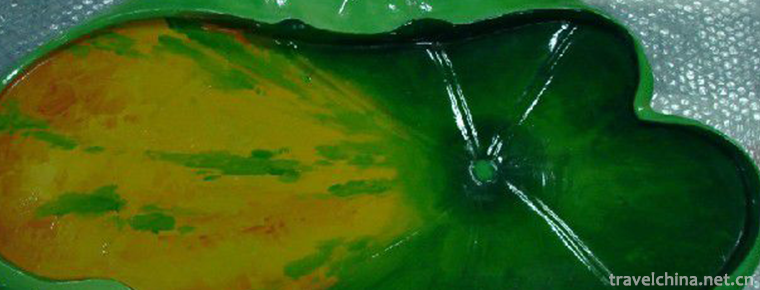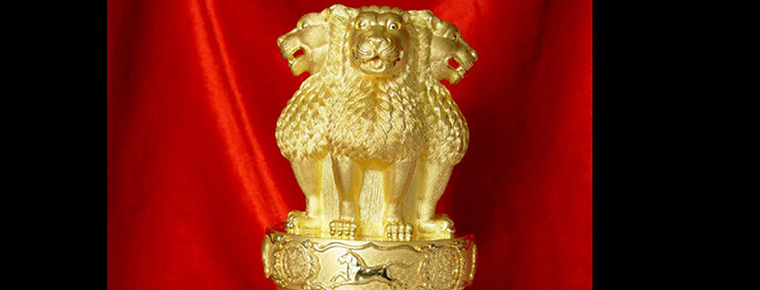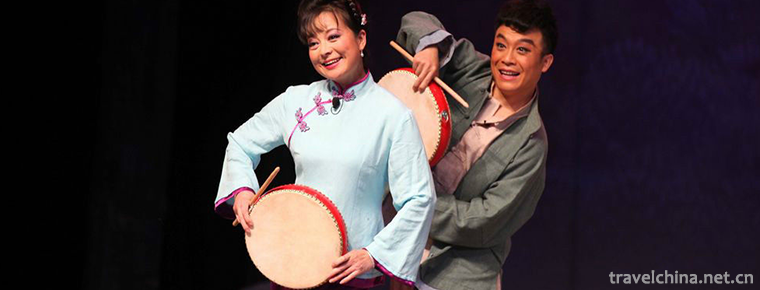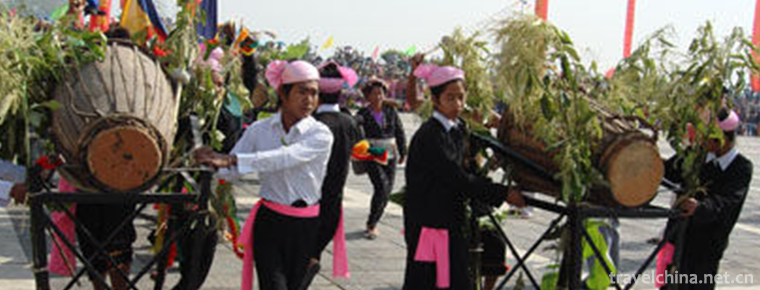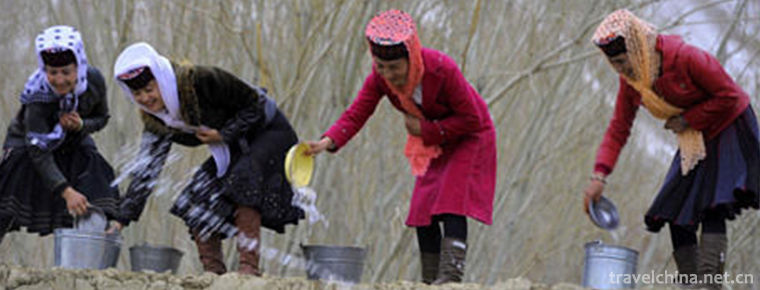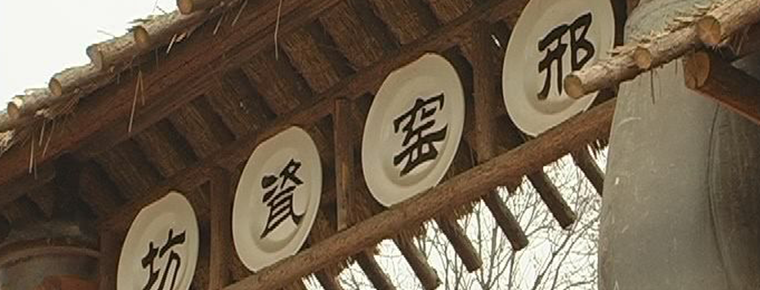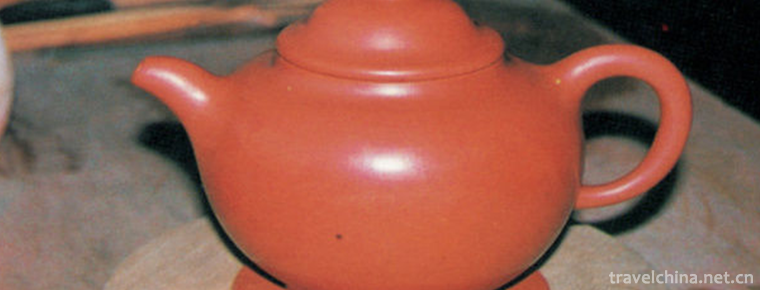Yulin Xiaoqu
Yulin Xiaoqu
Yulin Xiaoqu, also known as Yulin Qingqu and Fugu Xiaoqu, is a sitting art form accompanied by musical instruments.
The lyrics of Yulin Xiaoqu are integrated with elegance and vulgarity. In terms of language style and structure, there are not only words used by ordinary scholars, but also local dialects and dialects. The singing form is simple, portable and flexible. Originated in Fugu County of Northern Shaanxi Province, it distributes in Shenmu, Fugu, Northern Shanxi and parts of Inner Mongolia. The representative plays include Sunset and Dusk, Liang Shanbo and Zhu Yingtai, etc.
On May 20, 2006, Yulin Xiaoqu was approved by the State Council to be included in the first batch of national intangible cultural heritage list, numbered V-28.
Historical Evolution
Background Origin
Yulin is located in the blending zone of ancient Hetao culture and Hun culture. During the Zhao and Han Dynasties, it was the cultural center of northern Shaanxi. However, due to the frequent migration of minority nationalities such as Qiang, Hu and Turk, it became an inevitable place for military strategists, which made the cultural form here present some unique characteristics. According to the Yulin Fuzhi, Yulin has become one of the nine border towns in China since the Acropolis was established in Chenghua, Ming Dynasty (1473), and a large number of immigrants have settled in it. More and more foreigners have come to Yulin to become officials, especially those from Zhejiang Province, which accounted for more than 70% of the total number of foreign officials. The gathering of talents from all over the country has facilitated the exchange and integration of various cultures. Yulin Xiaoqu is a new artistic variety produced under this condition. Later in the long process of development and evolution, the local dialect singing and assimilating the local folk song minor, enriching and improving for today's folk art varieties.
Development
According to the special records of Emperor Qianlong of Qing Dynasty in "Bian Bian Bian Tong Jian Collection": Zhengde 13 years (1518) autumn and July, Ming Wuzong crossed the Yellow River from Shanxi, arrived in Fugu of Shaanxi, arrived in Yulin in October, and lived in Taiyi Temple in the city (i.e. "Kaige Tower"). Every day there are songs, dances and singing. It was not until early February, 1519, when Zhengde returned to Beijing Normal University. Before the march, Dai Qin's daughter was admitted as the concubine of Yande General Soldier, and women's music was marched. According to Yu Lin Fu Zhi, Tan Jicong, who came from the south of the Yangtze River in the ninth year of Emperor Kangxi (1670), was a colleague of Yulin Fort. This man is very familiar with the shape and customs of Yulin's "frontier and weidi" and "the selection of the eldest son is also emphasized in character art and literature" and "the artistic and literary aspirations of the military, water conservancy and horse political and military personnel should be the same". He was very fond of Jiangnan Xiaoqu and brought his family members and maidservants to Yuyu. Geisha and musical instruments are often asked to sing for them in their spare time, and even when he is presiding over the revision of town records, artists are invited to play and sing. Xu Zhankui, the general soldier of Yulin, said in the preface to the revision of Suide Town in Yan'an: "When he was in the east of the department, he gathered in the green hall and played silk and bamboo. Drink between drinks. According to the records in Yulin Fu Zhi Literature and Art Zhi, after the twelve years of Emperor Kangxi in the Qing Dynasty (1673), the city of Yulin was often "full of literature and art", often "midnight music listening to the city", and there were often "Qiang flute playing new tunes, Qin Zheng playing sharp strings" upstairs in Kaige. Its grand occasion can be seen.
At the end of Qing Dynasty and the beginning of Republic of China (1909-1914), Yulin Xiaoqu developed to a certain extent. Some folk music was absorbed and applied among the people, especially among small handicraftsmen, and learning to sing Xiaoqu became popular. With the increasing number of artists, Xiaoqu appeared in its flourishing period, and created works such as Grand Master Chen's Inauguration. During the period of Guangxu, Wang Jishi, a scholar, not only collected a large number of ditties, but also processed and polished them. New developments included more than twenty ditties such as "Ten Cups of Wine", "Jinlanfang", "Xiaodingzui", "Providing Moonlight", and nearly ten instrumental music titles such as "Four Rounds", "General's Order" and "Lion's Order". Although Yulin Xiaoqu originated from the Ming and Qing dynasties in the southern part of the Yangtze River and the tune of the time, once it was rooted in the soil of northern Shaanxi, Yulin Xiaoqu must be integrated with the local language and folk music, absorbing and developing, forming its own unique charm. Officials and businessmen from the South brought along the silk and bamboo orchestras and prostitutes from the south, and merged them with the folk songs from the north. Over time, Yulin Xiaoqu not only had the ruggedness and boldness of the north, but also had the tenderness and sweetness of Jiangnan Waterfront.
Artistic Characteristics
Singing Form
The singing form of Yulin Xiaoqu is very simple. Generally, there is no decoration and no performing action. In the old days, when officials and wealthy families were red and white, they held hall meetings to sing songs in a noisy atmosphere. Generally, people in the city also sang songs to cheer up the festival. Until the founding of New China, mass cultural and entertainment activities flourished. Yulin Xiaoqu was not performed on the stage by family courtyards and self-music singing in summer nights. In form, it also developed from one or two people in the past to many people singing. Singers have also gradually integrated into the genuine male and female singing by imitating female tunes and using fake male voices in the past. In most singing activities, the orchestra plays one or two instrumental music cards to show the silence, and then begins to sing. A singing activity, let alone three or four hours.
Singing genre
The aria is the core part of Yulin Xiaoqu, and the aria is composed of Qupai, single repetition or tandem singing. In the aria, except for the two aria brands "Busy at the First Two Ends" and "Busy at the Last Two Ends", which are used at the beginning and end of a part of the repertoire, there is no brand for the other tracks. Whether it is a single or a couplet, a large number of them are dedicated to monographs. The formation of Yulin Xiaoqu, a local folk song, is not only directly influenced by living customs, traditional culture and the character and temperament of the local people, but also by the influence of language habits, dialects and pronunciation. Yulin Xiaoqu, a local music, is sung in Yulin dialect.
Accompanied instruments
Accompaniment instruments: The earlier forms of sitting accompaniment instruments include three strings, four hu, flute, fishing drum, simple board, gongs, cymbals, bronze bells, bangles, etc. Later, the piano, banhu, four boards, bamboo board, bully whip and so on were added. In sitting performance, only one or several instruments are selected because of the small number of staff. Most of the solo singing forms are composed of singers playing both the four-hu and the yangqin. In addition to the singer playing two kinds of instruments (stringed or percussive), the accompanist and the instruments he uses can also be added.
Melody characteristics
The number of tunes used in each version is unlimited, depending on the nature of the version. Some of the whole works are composed of many tunes, while others are composed of only one tune (the latter is more). These tunes have been developed by artists who collect folk songs at any time while singing in different places. It is characterized by its magnificent and colorful melody, large fluctuating range of lines, large range of intervals and wide range of sound.
Xiaoqu belongs to Qupai music, which has many independent vocal tunes and instrumental tunes. Instrumental music is a subsidiary part, which is a large, independent prelude and posthum played before and after singing. Preludes, also known as "Bantou" or "Opening Music" (similar to the breakthrough in opera), usually play three or four cards. Postscripts are optional, usually using only one card. There are also interludes in music books (but very few).
Classic repertoire
Yulin Xiaoqu's lyrics mainly reflect the life interest of urban residents, except for the works describing parting grief and love between men and women, there are some major exceptions, such as reflecting the life of tea shops and salesmen, such as "opening tea houses", "selling groceries" and "Xiajingzhou". It also depicts the hatred of green buildings and the suffering of nuns, such as "prostitutes". Complaint, Little Nun, and chapters vividly expressing folk customs, such as Flying Kites, Playing Swings and Stealing Red Shoes. Moreover, some popular folklore stories, such as Liang Shanbo and Zhu Yingtai, Zhang Sheng's Yingying Opera and so on, are also reflected in the minor operas with distinctive features. There are dozens of words in a long repertoire, such as 40 passages in "Harmful Dolls" and only four passages in a short one, such as "Providing Moonlight".
There are six groups of formats, that is, the upper and lower sentences constitute one aria, such as "Prostitute's complaint", "Big Send-off Lang" and "Sister's Sorrow", "Five Robins", "Three Kites" and "Five Paragraphs" such as "Nunnery's Difficulty" and "Four Paragraphs". The noun structure of lyrics is usually based on seven-character sentences. There are also five-character sentences, such as "Drum-drum-drum-drum-drum-drum-drum-drum-drum-drum-drum-drum-drum-drum-drum-drum-drum-drum-drum-drum-drum-drum-drum-drum-drum-drum-drum-drum
Epidemic areas
Originated in Fugu County of Northern Shaanxi Province, it distributes in Shenmu, Fugu, Northern Shanxi and parts of Inner Mongolia.
Inheritance and Protection
Current situation of circulation
Yulin Xiaoqu in history was mainly sung by enthusiasts in the form of self-entertainment and self-entertainment. Later, as a means of begging, street-to-street singing, hall-to-hall singing and high-stage business performances appeared. In the cultural life of local people, Yulin Xiaoqu played an important role. However, since China's reform and opening up, under the influence of market economy and modern culture, Yulin residents are no longer the fertile soil for Yulin Xiaoqu to grow and flourish in the past, and Xiaoqu artists are also hesitant to go astray. The development of this form of art is facing the difficulty of inheritance and the danger of losing it, and it needs to be protected.
protective measures
With the continuous deepening of intangible cultural heritage protection, Yulin relevant cultural departments began to take a series of rescue and protection measures for Yulin Xiaoqu, such as regularly granting inheritors subsidies; making use of major festival activities, to create more performance opportunities for performers of Yulin Xiaoqu, so that they can get one. Some income, etc.
Selected as a non-survivor
On May 20, 2006, Yulin Xiaoqu was approved by the State Council to be included in the first batch of national intangible cultural heritage list, numbered V-28.
representative figure
Lin Yubi, male, Han nationality, born in November 1945 (July 1946), is a native of Sifangtai Village, Yuyang District, Yulin City, Shaanxi Province. Lin Yubi grew up in the family of Yulin Xiaoqu. His father, Lin Maosen, is a well-known veteran traditional Chinese medicine in Yulin, enjoying a reputation as a veteran Xiaoqu artist. Lin Yubi learned to sing and play "Yulin Xiaoqu" with her father when she was 8 years old. She mastered the singing skills of major tunes with great difficulty in minor and middle tone, and the playing techniques of major accompaniment instruments. At the age of 15, Mr. Ye Zifeng was a teacher. He learned to play the dulcimer and got his real life. At the age of 16, Mr. Zhang Jianhan learned to play three strings. In the same year, he began to learn Beijing Hu performance with his brother Lin Yushu. Later, I learned how to play pipa, zither and other instruments. Over the past 50 years, Yulin Xiaoqu has been continuously collected and studied, and many endangered and lost tracks have been inherited. In February 2008, Lin Yubi was selected as the representative successor of the second batch of national intangible cultural heritage projects.
Wang Qing, male, Han nationality, born in Yulin, Shaanxi Province in January 1954. Wang Qing's grandfather Wang Jisan (1886-1956) is a famous Yulin Xiaoqu Yangqin artist, and his father Prince Ying (1910-1973) is a well-known Yulin Xiaoqu Guzheng performer. Wang Qing was educated by his family since childhood. At the age of 14, he followed his father Prince Ying to learn to play three strings and pipa. At present, he is the main Pipa player in Yulin Xiaoqu Band. In 2006, Wang Qing established the Yulin Xiaoqu Research Association, which serves as its own president and has more than 30 members. Every weekend, Yulin Xiaoqu Research Association will perform voluntarily for the citizens in Nanmen Square of Yulin City. The various performances and activities of the research association are continuous. Wang Qing, together with the Research Society, also collated and published Yulin Xiaoqu Album. However, at present, there are few successors to Shulin Xiaoqu. In February 2008, Wang Qing was selected as the representative successor of the second batch of national intangible cultural heritage projects.
The Value of Opera
Yulin Xiaoqu is the only art of sitting and singing in northern Shaanxi, which has the rhyme of Southern ancient songs. Yulin Xiaoqu, as a unique art which combines the masculinity of the north and the feminine beauty of the south, has unique artistic value and plays an important role in the cultural life of local people. There are a lot of chapters in Yulin Xiaoqu that reflect the life of the restaurant, the salesman, the hatred of the green house, the suffering of the nunnery and the expression of folk customs, which have important reference value for understanding the folk customs of northern Shaanxi in Ming and Qing Dynasties.

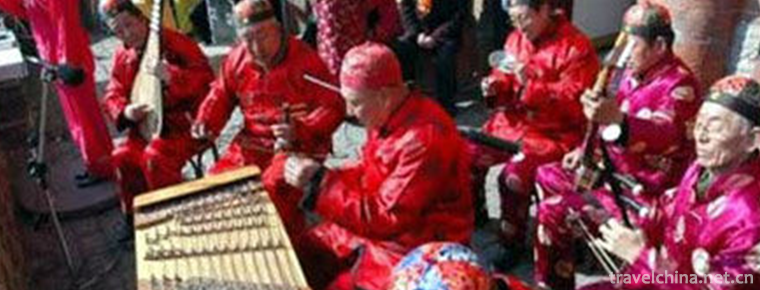
-
Fuzhou bodiless lacquerware decoration skills
Fuzhou bodiless lacquerware decoration technology, Fuzhou, Fujian Province, local traditional handicraft, one of the national intangible cultural heritage..
Views: 172 Time 2019-04-30 -
Gold and Silver Fine Craft
Gold and silver fine craftsmanship, Huangpu District of Shanghai, Nanjing City of Jiangsu, Jiangdu traditional handicraft, one of the national intangible cultural heritage..
Views: 206 Time 2019-05-07 -
Construction Techniques of Miaozhai Diaojiao Building
Miaozhai hanging-feet building is evolved from the form of "nest dwelling". It is built with bamboo and wood. The lower part of the building is hollow. It is called "semi-dry fence".
Views: 108 Time 2019-06-05 -
Shangluo Flower Drum
Shangluo Flower Drum, also known as Flower Drum and Ground Bumper, is popular in 7 counties (districts) of Shangluo City, Shaanxi Province, especially in Shangzhou, Danfeng, Zhenan and Zhashui. During.
Views: 180 Time 2019-06-13 -
Water Encouragement
Water drum dance is a kind of popular dance spread between the De'ang and Miao nationalities. It combines water, drum and dance to worship ancestors, pray for good weather and peace in villages. Howev.
Views: 139 Time 2019-06-15 -
Tajik Water Diversion Festival and Seeding Festival
In Tashkurgan Tajik Autonomous County of Xinjiang, Tajik Water Diversion Festival and Seeding Festival are Tajik agricultural festivals. In Tajik, the sowing Festival is called "Hamozivast" .
Views: 224 Time 2019-06-17 -
The game of go
Go is a strategic two-player game. It was called "game" in ancient China and "Go" in the West. Popular in East Asian countries (China, Japan, Korea, Korea), is one of the four arts.
Views: 283 Time 2019-06-26 -
Sintering Techniques of Xingyao Ceramics
Xingyao firing technology is a local traditional handicraft in Hebei Province. Xing kiln is a famous northern kiln in China. As early as the Northern Dynasty, Xing kiln began firing celadon and a smal.
Views: 225 Time 2019-07-08 -
Production Techniques of Yixing Purple Sand Pottery
Yixing Purple Sand Pottery Manufacturing Techniques, Dingshu Town, Yixing City, Jiangsu Province, local folk traditional pottery making techniques, one of the national intangible cultural heritage..
Views: 148 Time 2019-07-12 -
New brown leaf weaving
Xinfang Brown edition is one of the traditional handicraft products in China. It has entered the third batch of national intangible cultural heritage list recommendation project list. It originated in.
Views: 472 Time 2019-08-16 -
Tiantai Mountain in Qionglai
Tiantai Mountain Scenic Area in Qionglai is located in the southwest of Qionglai City, the hometown of Wenjun. It is the habitat of Sichuan Giant Panda. It is 110 km away from Chengdu City and 45 km away from Qionglai. .
Views: 192 Time 2020-11-05 -
Dazhou social security
In 2019, the per capita disposable income of Dazhou residents is 22995 yuan, an increase of 10.1%. The per capita disposable income of urban residents was 33823 yuan, an increase of 9.5%. Among them, salary income was 18783 yuan, an increa.
Views: 104 Time 2020-12-20
